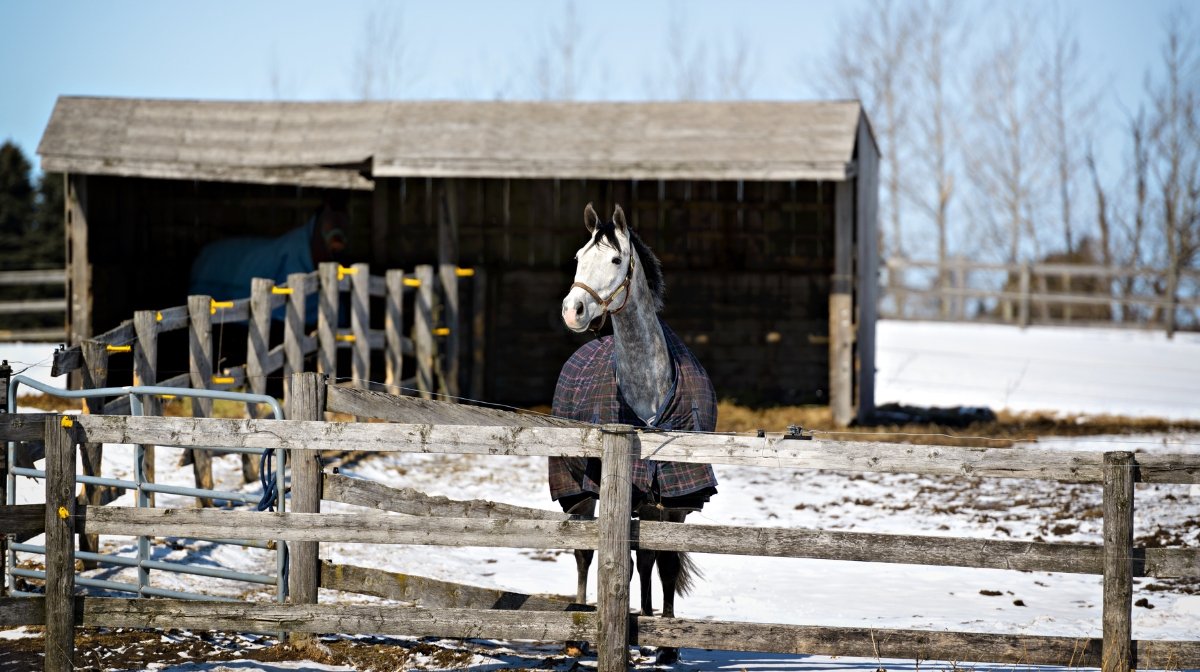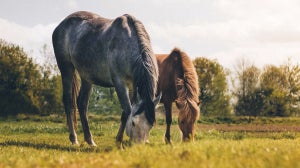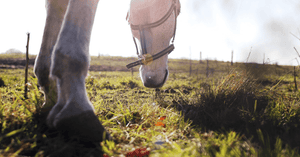
As winter approaches and brings new conditions and challenges, horse owners must pay extra attention to their horse or pony’s health and nutritional needs.
The cold weather that comes with the winter months poses real and unique challenges to maintaining a horse's health. This means it’s important to make adjustments to their diet so that we keep them in the best condition possible.
In this article, we will explore some of the essential tips for feeding your horse during the winter months, ensuring they receive the necessary nutrients to thrive and stay healthy.
- Assessing their body weight and condition
- Ensuring they have adequate forage
- Monitoring water intake
- Adjusting feed and concentrates
- Essential nutrient supplements
- Maintaining their gut health
- Keeping a consistent feeding schedule
- Shelter and protection from the elements
- Regular health check-ups
- Exercise and mental stimulation
- Be mindful of ice and slippery surfaces
1. Assessing their body weight and condition
Before making any adjustments to your horse's diet, it's crucial to assess their body condition. A horse's weight can fluctuate during winter due to using up more energy than in the warmer months to stay warm, alongside any changes in the quality of the feed they receive.
There are 3 main ways of assessing body weight and condition: Using a weighbridge, using a weigh tape, and Body Condition Scoring. Ideally, horses will be monitored using a combination of all of the above. Often, vet practices and feed companies will have a weighbridge and can come out and weigh your horse/pony and can discuss weight and condition related issues and feeding practices at the same time. This can be a great way of establishing a baseline, you can then continue to track their weight and condition every two weeks using a weigh tape and Body Condition Scoring methods. Feed ration can then be adjusted based on if your horse needs to gain, maintain or lose weight during the winter.
2. Ensuring they have adequate forage
Forage is an important part of your horse's diet, providing essential fibre and nutrients. In winter, when the quality of the pasture forage may be more limited, it becomes even more critical to ensure your horse has access to good quality forage.
If required, you can increase the amount of hay they have available, preferably high-fibre varieties, so that they can compensate for the potential lack of fresh grass. The digestive process of breaking down fibre helps generate internal heat, aiding in maintaining body temperature during colder weather, alongside filling them up of course.
3. Monitor their water intake
Horses may reduce their water intake during winter for a handful of reasons, which can lead to dehydration. Ensure your horse has access to fresh, unfrozen water at all times. Dehydration can contribute to colic and other health issues, so closely monitor your horse's water consumption throughout the winter months.
4. Adjusting feed and concentrates
The requirement for energy in horses and ponies increases in winter as they expend more energy to stay warm. As a result, you should adjust the grain and concentrate portion of their diet to account for this.
Make sure to consult with your vet to determine if concentrate feeds are needed, and if so, how much and what type. This may be based on factors such as age, weight, and activity level. However, you should also be cautious not to overfeed as excess weight gain can lead to health problems such as laminitis.
5. Essential nutrient supplements
In areas where winter pasture quality is low, supplementing your horse's diet with essential nutrients is crucial. Vitamins and minerals, such as Vitamin A and Vitamin E, could be deficient in winter forage. Consider providing a balanced equine supplement or consulting with a vet to address specific deficiencies based on your horse's needs.
6. Maintaining their gut health
Maintaining good gut health for your horse is paramount, especially during winter when digestive challenges can occur. The increased consumption of hay and concentrates may predispose horses to colic and other gastrointestinal issues.
To promote a healthy digestive system, you can consider incorporating gut health supplements into your horse's diet. These beneficial microorganisms aid in maintaining a balanced gut flora, supporting efficient digestion.
Regularly monitoring subtle changes such as your horse's droppings and behaviour can be very helpful in offering early indicators of any potential digestive disturbances, allowing for you to intervene if there are any issues with their gut. Again, consult your vet if you want more information on your horse’s gut health, or if you have any concerns.
7. Keeping a consistent feeding schedule
Horses thrive on routine, and maintaining a consistent feeding schedule becomes even more important during winter. Feeding your horse at the same times each day is a great way to promote digestive health for them.
Regular feeding helps regulate your horse's metabolism and keeps their digestive system functioning optimally.
8. Shelter and protection from the elements
While it’s vital to have high-quality nutrition for your horse or pony, ensuring they also have adequate shelter is equally important during the colder months. Being exposed to the more harsh and severe weather conditions can be a significant contributor to them falling ill or contribute to their stress and weight loss.
Provide them with a well-insulated, weatherproof shelter where they can stay warm and comfortable from the wind, rain, and snow. Alongside this, you can also consider using rugs or stable blankets to help maintain body warmth, especially for horses who might be clipped.
9. Regular health check-ups
Schedule a check-up with your vet throughout the winter season to monitor your horse's overall health. Winter conditions can exacerbate any of their existing health issues, and early detection is key to preventing more significant problems.
You should discuss any changes in your horse's behaviour, weight, or appetite with your vet to address potential concerns and make sure they’re fighting fit for when the colder months arrive.
10. Exercise and mental stimulation
While it’s important to protect your horse from the elements, it should not be a time of confinement for your horse. While weather conditions may limit outdoor activities to some degree, you can find ways to provide exercise and mental stimulation.
This can include setting up safe exercise areas, or going outside for shorter periods so they are able to exercise. Regular movement is good for maintaining muscle tone, joint health, and mental wellbeing, contributing to an overall healthier horse.
11. Be mindful of ice and slippery surfaces
Navigating icy and slippery surfaces poses a risk to both you and your horse. Be cautious when leading, riding, or turning out your horse in winter conditions.
Clear pathways of ice, use salt or sand for traction and be aware of the potential dangers to avoid accidents and injuries.
Conclusion
Feeding your horse in winter involves a careful balance of nutrition, management, and attention to their overall wellbeing. By assessing the condition of their body, providing them with high-quality forage, adjusting feed and concentrates, and ensuring that they are ready for the specific challenges of the colder months of winter, you can ensure your horse not only stays healthy but thrives during this time of year.
It’s important to remember that each horse is unique, and consulting with your vet to tailor a plan for feeding them in winter for your horse's specific needs is a very sensible idea for their general health and overall wellbeing.









